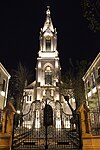National Library of Azerbaijan

The Mirza Fatali Akhundov National Library of Azerbaijan (Azerbaijani: Mirzə Fətəli Axundov adına Azərbaycan Milli Kitabxanası) is the national library of the Republic of Azerbaijan, located in Baku and founded in 1922. It is named after Mirza Fatali Akhundov, an Azerbaijani dramatist and philosopher. The library is located on Khagani Street and overlooks Rəşid Behbudov Avenue and Nizami Street. Its facades feature the statues of various writers and poets: Nizami Ganjavi, Mahsati, Uzeyir Hajibeyov, Shota Rustaveli, Alexander Pushkin and several others. A vast, eight-stage repository occupies the four floors of the building and is equipped with special elevators, which deliver the books to the outlets. The capacity of reading rooms is 500 seats. Orders are also accepted by e-mail upon electronic registration. The library includes 25 sections and 26 sectors. The fund of the library covers approximately 4,513,000 publishing materials.
Excerpt from the Wikipedia article National Library of Azerbaijan (License: CC BY-SA 3.0, Authors, Images).National Library of Azerbaijan
Khagani Street, Baku City
Geographical coordinates (GPS) Address Nearby Places Show on map
Geographical coordinates (GPS)
| Latitude | Longitude |
|---|---|
| N 40.374166666667 ° | E 49.845833333333 ° |
Address
Khagani Street 29
1010 Baku City (Sabail Raion)
Baku, Azerbaijan
Open on Google Maps








